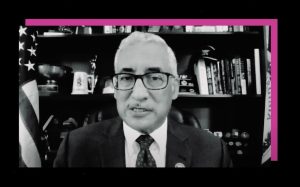Many students have switched to online learning over the course of the pandemic. This presented difficulties to many Student Veterans since the GI Bill cuts the Monthly Housing Allowance (MHA) of online students down to half of the national average. As a result, many Veterans were forced to make tough decisions in order to keep a roof over their head, even as they were told to stay indoors.
Fortunately, legislation was passed to protect Veteran benefits and ensure that they continued to receive the same amount of MHA as prior to transitioning to online learning. This has worked for Student Veterans who had previously studied in person. However, Veterans who had already studied online still received reduced housing assistance. This pandemic has shifted attention to this inequity among Veterans who equally earned their benefits, but do not receive the same treatment.
Not only do we have a two-tiered MHA system, but we are punishing Veterans for making educational decisions that work best for them. Online schools are popular among Veterans since they provide flexibility and lower costs that accord with the needs of non-traditional students, such as Veterans.
Unlike your average student, a Veteran is more likely to have a family, a job, and other obligations that make a traditional, in-person, 4-year degree less appealing as compared to online courses. However, the prospect of reduced MHA disincentivizes Veterans from choosing online programs and punishes those schools, typically private institutions, which are making the changes to become more Veteran-friendly.
Furthermore, many colleges and universities have switched to online learning since the pandemic. It is certainly the case that many have found this new online mode of studying preferable to the pre-COVID, in-person mode. For instance, big public colleges, originally approved for in-person learning, had to switch to online during the pandemic. Now, these large public schools risk losing their GI Bill Eligibility if they don’t return to in-person by July 2, 2022.
These schools worked hard to move their courses online and ensure that all could continue their education over the past two years. The need to move online made sense in the context of saving lives during a global pandemic. However, nobody is threatened by continuing online courses and it makes little sense for the VA to dictate whether a course should remain online or return to in-person.
We have continued to raise awareness and bring legislators’ attention to this issue. This includes a white paper published at the beginning of the COVID-19 pandemic. It is not the choice of the VA to determine whether Veterans have earned their full housing allowance or not. Online students need to pay for housing just as in-person students do. In our white paper, we propose that “online-only veteran students receive an MHA entitlement equivalent to the zip code of their residence.”
Online only student veterans are not currently afforded equivalent MHA entitlements as those of their peers. This two-tiered policy is working against the interests of Veterans and we urge the VA to bring MHA for online Student Veterans to parity with their in-person counterparts. We will continue to push for a fairer MHA policy for Veterans who choose online learning.




